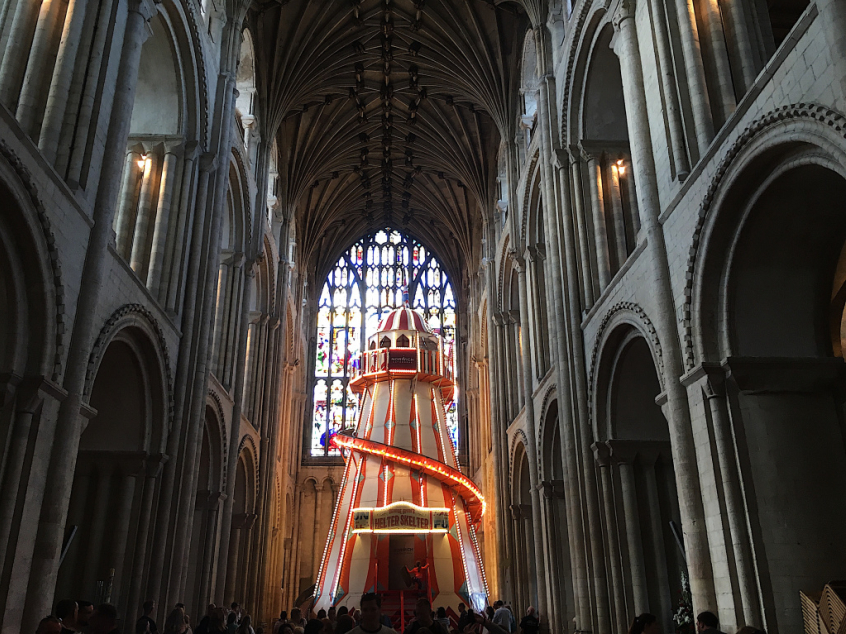
It's not often a Church initiative makes BBC front page news. But that's exactly what happened twice this summer with Rochester and Norwich Cathedrals' unorthodox holiday schemes. The former had installed a nine-hole crazy golf course in the nave whilst Norwich has just closed its 55-ft helter skelter, which raised visitors up to the ceiling. One wonders what the Norman builders would make of all this.
You don't have to wonder about people's current opinions, however. The golf course and helter skelter have divided both the Christian and non-Christian world alike. Critics, including high profile clergy, have branded them a 'mistake' in encroaching on the sanctity of worship spaces and others deride the 'desperation' of the schemes. Whether the moves are inspired or ill-advised is discussed on work coffee breaks and group WhatsApps, but despite the debate circling their naves both cathedrals have remained firmly behind their decisions.
Disagreement over a helter skelter and a mini golf course might at first glance seem trivial but it speaks to a much bigger debate around the Church and its role in the world. What part should the Church play in modern society and how can it be welcoming and inclusive without losing sight of its mission and message? Helter skelters in the nave might be a purely 2019 phenomenon but the controversy they provoke is symptomatic of the millenia-old tension Christians face on a daily basis: being in the world but not of it, being part of modern culture yet also very distinct and different from it.
Critics of Rochester and Norwich Cathedrals might suggest that they have tipped over into the 'of the world' side, turning a cathedral into just another building with a 'gimmick' to get people through the doors. But it's exactly by changing the perception of a church, and consequently the Church, that Christians will progress in their mission in the world. A helter skelter and a golf course welcomes people in from every background, ethnicity, class and identity and shows them that worship spaces and our faith aren't just for some elite group of holy people. Working to democratise cathedrals, churches and any Christian space is absolutely what the Church should be doing in living out the call to embrace everyone no matter where they come from.
This push for accessibility is very important for the traditional Church whose history has long been entwined with class. From Latin-only services to its interplay with an unequal social hierarchy, it has been implicated over time in elitism and reinforcing power dynamics which are contradictory to the Bible's message. All institutions in the 21st century - from universities to theatres and political groups - are struggling to redress their record and make their physical and metaphorical spaces open to all. Surely the Church, whose core message is founded on love and equality, should be leading these efforts for inclusivity.
However, that's not to say that every plan should not be carefully and prayerfully considered. Any non-service event occurring in a building of worship makes minds jump to Jesus cleansing the temple and pause should be taken - but Rochester's mini golf and Norwich's helter skelter are not the actions of money changers. If the vague stress of the winding helter skelter queue seems at odds with the usually tranquil atmosphere of Norwich Cathedral's nave, it's ultimately no different to the paying crowds in St Peter's Basilica or St Paul's. The purpose of such schemes shouldn't be to secure national coverage but if they do, that's not automatically a sign they're a bad thing.
I've also never seen so many people inside Norwich Cathedral when it's not been Christmas Eve: literally thousands have visited the cathedral because of the attraction. It was a joyful experience in itself to hear the mix of voices of all God's children, Christian and non-Christian, echoing around its bosses and columns. Rochester Cathedral has also reported dramatically increased visitor numbers and even an increase in service attendance due to their golf course. However, parishioner figures shouldn't be the way we determine whether these schemes were a success. No building can act as a conversion-machine and indeed no one is looking to 'trick' people into looking for God. The aim of these schemes isn't to suddenly make everyone Christians but to show that Christianity and its spaces are for everyone and why that's the case. Evangelism isn't transactional: you don't get a return on investment on people. Christians are called to share the good news but people coming to faith is God's work, not ours.
Cathedrals are holy, special, beautiful places, the physical embodiment of worship to God. As such, there's a degree of honour and reverence that accompany them. But the Church is not a church, or even a cathedral. Contemporary Churches, who meet in rented rooms, have no lesser relationship with God because they lack a permanent building. An upper room is as fit for God as an Abbey. Christianity is about communion - with God, with others, with His creation - and as the Church faces the unique challenges of today it's crucial to remember this.
Grace MacDougall grew up in Norwich and works at a PR and communications agency in London.













